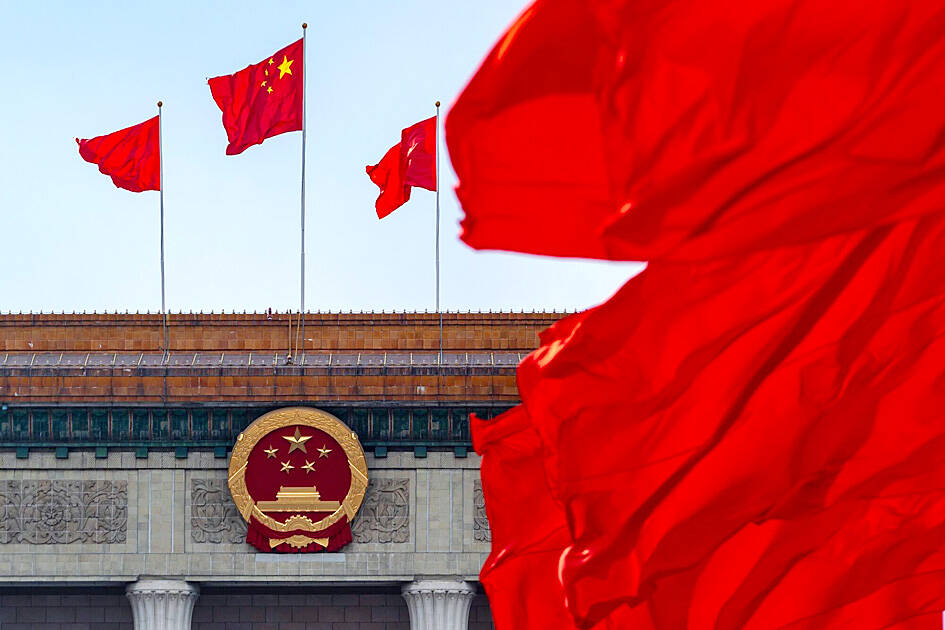China’s Patriotic Education Law, implemented last year, included patriotism and party loyalty in China’s legal framework, requiring unconditional loyalty rather than earning public trust, a Taiwanese academic said.
Since the law’s implementation more than a year ago, China’s local governments have promoted events and education centered around party loyalty, patriotism and socialism, National Cheng Kung University political science professor Hung Chin-fu (洪敬富) wrote in an article published in the Mainland Affairs Council’s latest briefing.
Beijing has also amplified narratives about anti-China forces interfering in domestic affairs, particularly regarding Taiwan, democracy, human rights and governance systems, he said.

Photo: Bloomberg
China uses patriotism as a tool to rationalize nationalism, he said, adding that the Chinese Communist Party justifies its actions by calling them “patriotic,” and combines nationalism with national interests.
Actions by nationalists online, including xenophobic statements, boycotting foreign products and promoting national brands, are glorified as expressions of patriotism and party loyalty by the public and government officials, Hung said.
The prevalence of xenophobia in Chinese society has manifested in attacks on foreigners, Hung added.
For example, four American teachers on June 11 last year were attacked in Jilin Province by a man with anti-US sentiments. On Sept. 28 last year, a 10-year-old Japanese boy was attacked on his way to the Shenzhen Japanese school and died from the injuries at a hospital. Then there was the Chinese man who on Oct. 1 spoke of party loyalty and patriotism before attacking three five-year-old children in Zurich, Switzerland.
Those tragic events show how China’s narrow nationalist ideology and patriotic education has fueled violent xenophobic sentiments, Hung said.
The Patriotic Education Law integrates party loyalty, patriotism and socialism into China’s legal framework, rather than being limited to propaganda, he said.
That “trinity” put forth by Chinese President Xi Jinping (習近平) is captured by the slogan “listen to the party, thank the party and follow the party (聽黨話,感黨恩,跟黨走),” he added.
China is so focused on cultivating patriotism that it largely neglects public welfare, such as providing necessary services, including medicine, employment, education and housing, Hung said.
The Chinese government should focus on people’s needs and earn the public’s trust through concrete action, rather than requiring them to be unconditionally loyal and patriotic, he said.

Alain Robert, known as the "French Spider-Man," praised Alex Honnold as exceptionally well-prepared after the US climber completed a free solo ascent of Taipei 101 yesterday. Robert said Honnold's ascent of the 508m-tall skyscraper in just more than one-and-a-half hours without using safety ropes or equipment was a remarkable achievement. "This is my life," he said in an interview conducted in French, adding that he liked the feeling of being "on the edge of danger." The 63-year-old Frenchman climbed Taipei 101 using ropes in December 2004, taking about four hours to reach the top. On a one-to-10 scale of difficulty, Robert said Taipei 101

Taiwanese and US defense groups are collaborating to introduce deployable, semi-autonomous manufacturing systems for drones and components in a boost to the nation’s supply chain resilience. Taiwan’s G-Tech Optroelectronics Corp subsidiary GTOC and the US’ Aerkomm Inc on Friday announced an agreement with fellow US-based Firestorm Lab to adopt the latter’s xCell, a technology featuring 3D printers fitted in 6.1m container units. The systems enable aerial platforms and parts to be produced in high volumes from dispersed nodes capable of rapid redeployment, to minimize the risk of enemy strikes and to meet field requirements, they said. Firestorm chief technology officer Ian Muceus said

MORE FALL: An investigation into one of Xi’s key cronies, part of a broader ‘anti-corruption’ drive, indicates that he might have a deep distrust in the military, an expert said China’s latest military purge underscores systemic risks in its shift from collective leadership to sole rule under Chinese President Xi Jinping (習近平), and could disrupt its chain of command and military capabilities, a national security official said yesterday. If decisionmaking within the Chinese Communist Party has become “irrational” under one-man rule, the Taiwan Strait and the regional situation must be approached with extreme caution, given unforeseen risks, they added. The anonymous official made the remarks as China’s Central Military Commission Vice Chairman Zhang Youxia (張又俠) and Joint Staff Department Chief of Staff Liu Zhenli (劉振立) were reportedly being investigated for suspected “serious

American climber Alex Honnold is to attempt a free climb of Taipei 101 today at 9am, with traffic closures around the skyscraper. To accommodate the climb attempt and filming, the Taipei Department of Transportation said traffic controls would be enforced around the Taipei 101 area. If weather conditions delay the climb, the restrictions would be pushed back to tomorrow. Traffic controls would be in place today from 7am to 11am around the Taipei 101 area, the department said. Songzhi Road would be fully closed in both directions between Songlian Road and Xinyi Road Sec 5, it said, adding that bidirectional traffic controls would